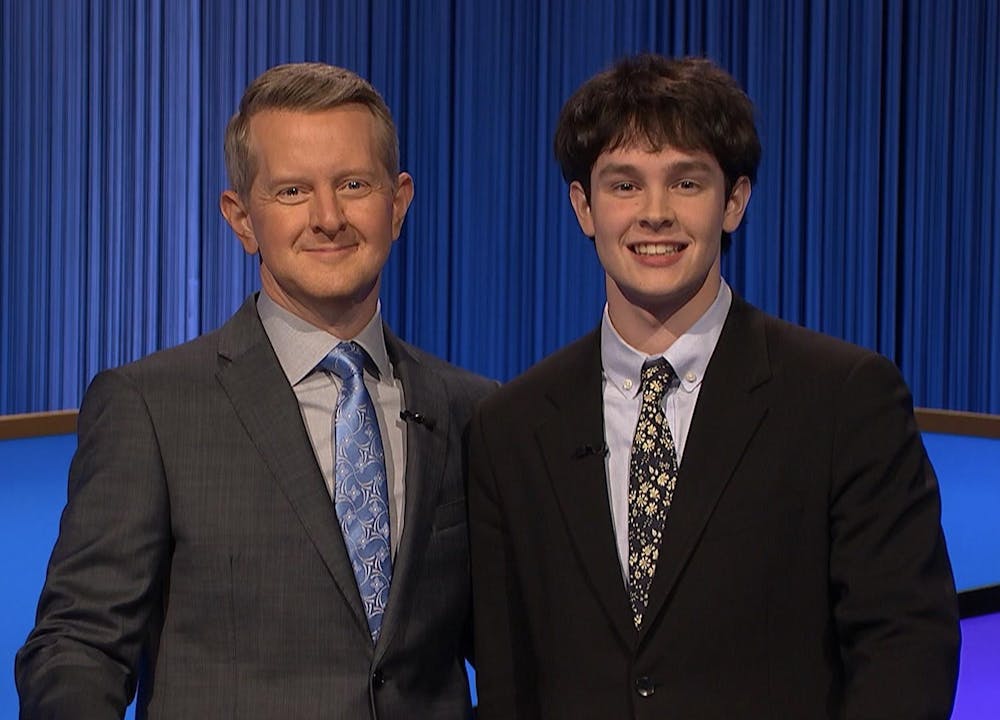Justin Bolsen ’26 will compete in this year’s ‘Jeopardy!’ Tournament of Champions, the first episode of which will air Tuesday night. Having won the ‘Jeopardy!’ High School Reunion Tournament last spring, Bolsen “knew the grand prize was the money and also the invitation” to return to the show, he told The Herald.
As the youngest person to compete in the Tournament of Champions, Bolsen described feeling like he was “playing with house money.”
“I don’t really think the stakes were at all as high as the first time,” he said. “This time, I was really happy to be there.”
Rotimi Kukoyi, a fellow ‘Jeopardy!’ contestant and good friend of Bolsen, met the champion after they both competed in the Teen Tournament. Kukoyi also returned to the program this year for the Second Chance Tournament — an opportunity for those who did not win their original game to compete.
According to Kukoyi, participating in the Second Chance Tournament and the Tournament of Champions differs from the High School Reunion Tournament as they no longer compete against people of their own age. “It’s very different (to be) competing against adults,” Kukoyi said.
“This season is one of the most competitive Tournament of Champions fields ever,” Kukoyi added. At this year’s tournament, 27 contestants will compete — the largest in the program’s history.
“These guys are the top 10 finishers in the national quizzing championships,” Bolsen said of the other contestants. “They’re ridiculous.”
Bolsen added that his preparation process is “the first thing people ask” about when they hear he was a contestant on ‘Jeopardy!’
“There’s only a set number of things that (the tournament) can ask about, because if you’re sitting at home and they’re asking the name of a ship from the 14th century, no one at home is going to have any idea,” he said. “They want to write the questions to make them accessible to people at home, but also difficult.”
“When you have an idea of what they can possibly ask about, then you can start to study,” he added.
As part of this process, Bolsen refers to past games: “I would archive the questions I didn’t know, I would turn them into flashcards and then I would go through that flashcard system.”
Bolsen described studying pop culture as one of his biggest challenges while preparing. “I felt like my base was always strong in academic subjects, like history, geography (and) science, because I grew up doing Quiz Bowl … My base knowledge for that was a lot better than my base knowledge for pop culture.”
To study pop culture, Bolsen turned to ChatGPT. “I was like, ‘Hey, ChatGPT, can you give me the top ten movies from the 1950s?,’ because I’m not watching 1950s movies,” he said. “Studying pop culture is really hard. How do you learn about TV shows without actually watching them?”
Before turning to ChatGPT, he relied upon “encyclopedia-type digestible” books.
Aside from ChatGPT and flashcards, Bolsen also kept himself in “the mindset to solve” by completing crosswords and puzzles, calling them all “interconnected.”
His preparation also changed from the last tournament to now focusing on buzzer speed. The show only allows contestants to buzz in after the question is read and a signal light turns on.
“If you miss that window with the light, you’re locked out of the question,” he said. “I was doing human benchmark Aim Lab reaction-time tests” — a popular aim-training shooter game — “to try to get myself quicker on the buzzer.”
Before the tournament, Bolsen removed sources of distractions. “I deleted TikTok,” he said. “Whenever I thought about opening my phone and scrolling, I was doing a Sporcle quiz instead.”
Rocky Mattos-Canedo ’26, a former Herald photographer and one of Bolsen’s close friends, spoke to The Herald about his preparation process as well. “Justin takes it very seriously,” she said. “I think if anyone can perform under pressure, it’s Justin … He’s very good at keeping himself focused on one goal.”
Kukoyi and Bolsen prepared for their respective tournaments in parallel. Bolsen said that they were both “going in with the same mindset,” adding that they bounced ideas off each other and shared preparatory resources.
The process of preparing also brings together the larger ‘Jeopardy!’ community, Kukoyi said. He described “a big GroupMe with everybody” on the Teen Tournament. “The broader group chat was really helpful in terms of sharing resources. They were like, ‘you guys should read this book,’ ‘these were fact-sheets online that I memorized’ (and) ‘this is how I practiced for the buzzer.’”
“There’s a really thriving community,” Kukoyi said. “We visit each other all the time, we have Meme Monday now on the group chat … It’s a very rich network of friends.”
Kukoyi added that he had visited Bolsen at Brown twice.
Aside from preparation, Kukoyi described viewing the older alumni of the Teen Tournament as “big siblings.” “We can get advice, not just about ‘Jeopardy!’, but about things we’re going to deal with in college and things we’re going to deal with in life, in the workforce.”
Mattos-Canedo also described how Bolsen uses the tournament to “bring all his friends together.”
“We’re just really excited to see him be up there, and he’s doing a little trivia tournament before his episode, so it’s just more of a celebration than anticipation this time around,” she said.
“I love trivia so much,” Bolsen said, “and every time I get to share that with people, it makes me happy.”





